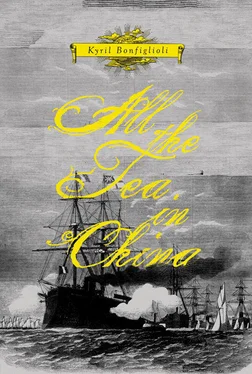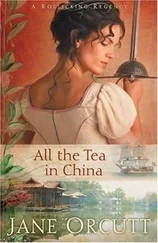Then, on advice, I took a cab to Number 205, Regent Street, where a Mr Beattie sold me a large revolving pistol made expressly for him by J. Lang himself. It was in a mahogany case, complete with moulds for both ball and bullet, a wad cutter, powder-measures and everything else proper to such a weapon. It was very costly, but the best that money could buy. I felt something of a fool as I walked out of the shop, my pockets lighter by so many guineas. It was to be several months before I congratulated myself upon buying so reliable a weapon.
Lord Peter Stevenage roared with laughter as he saw Orace staggering up the gangplank that afternoon; the child was so heavily burdened that I was having to push from behind to keep him upright. Had I not so recently become an English gentleman I believe I would have carried some of the parcels myself.
“You luxurious bugger!” cried Peter merrily, “is this the last of your stores? Your dunnage has been streaming aboard all day, quite altered the ship’s trim, burst me if it hasn’t! Come to the cabin, if that child can still walk, and let’s overhaul this gear of yours.”
He seemed taken aback at my choice of clothing and, since he was now free of the watch, offered to take me to a ship-chandler’s slop-shop. There were many such places within a stonesthrow of the docks but Peter led me unerringly to one where, he said, the proprietor was too intelligent to rob one more than was reasonable. He made me buy two suits of oilskins, two pairs of sea-boots and some huge slabs of smelly, greasy wool which he said would prove, when unfolded, to be warm underclothing. I protested that my duties were to be mercantile rather than maritime and that I had no intention of scrambling up and down masts and riggings in the wind and weather-oh — why then should I need such things?
He looked at me strangely.
“Well,” he said, “you never know. It might come on to rain or something, d’you see. Now, you’d better have a couple of ‘thousand-milers’ — and one for the little bastard, too.” A “thousand-miler” turned out to be a sort of durable shirt made of black twill; so-called, Peter solemnly assured me, because it should be washed and changed after every thousand miles of the voyage, whether it was dirty or not. These shirts did not appear comfortable at all but Peter explained that I must ask the Doctor to put them in the copper for me when next he was boiling a “duff” or pudding: this would make the garment supple and kindly to the skin, because of the suet-grease in the water.
I made a few other purchases at his suggestion, such as spermaceti candles, sticks of coarse barley-sugar, a pocket compass with folding sun-dial attached and some strong soap containing the biniodide of mercury to combat an infestation called “the crabs” by sailor-folk.
Our cabin, when we had brought in this final consignment of my goods, seemed quite full — “something of a Hoorah’s nest” Peter called it — but he soon shewed Orace how and where to stow everything in ship-shape and seaman-like fashion and we were snug in next to no time. It was by no means a squalid little room — the fittings of brass and mahogany reminded me that this had once been the yacht of a Lord — and the hard mattress of my bunk was of good horsehair and not smelly. Peter’s possessions were few: a sea-chest of clothes, a brass-bound mahogany chest of arms, a shelf of books. Some of these last were by heathen authors, some by a person writing under the nom-de-plume of “Jane Austen” — I came to know his work well during the voyage, he had a wonderful insight into the female mind, wonderful.
Peter and I cracked a bottle of Lord Windermere’s Sercial before settling down for the night; it was rich and strong. He dowsed the candle early for we were to sail with the tide at first light.
Ships, in these nasty nowadays, are made of iron and propelled by coal. This may be a good thing, I cannot say. What I do know is that the ships of those days, real ships, wooden ships, were alive: they manifested their life in a thousand ways which at first irked — sometimes frightened — me, but later became a reassuring cradle-song when I had learned to single out each noise and understand its origin. The gurgle of the running tide past the ship’s strakes, the gentle schlipp-schlopping of the wavelets created by a passing vessel, the soft, grinding bump, more felt than heard, of a fender nudging the quay-side and the moan of standing rigging set vibrating by the wind — all these I had heard before, although on a smaller scale, but now there were countless other noises new to me. In particular I recall from that first night the placid straining and grunting of great timbers which had learned to live and work together, the rattle of the gangplank and boom of feet on the deck-planks which told of Johnny-tars rejoining ship at the last moment before midnight, the sudden clangour of the ship’s bell marking the watches and, once, the squalling scream of the ship’s cat locked in a death-struggle with some unhappy rat.
The smells, too, remain with me, although I have long since, and often, smelled worse. Peter’s hair-lotion was sharp and agreeable; it reminded me of the verbena plant in my mother’s window. Tar and timber and paint are good smells; so were the mingled richnesses of our cabin-stores, especially the Stilton cheese. The London River, laden with sewage, was less good and, when the ship pitched a little as another vessel passed, our bilges, disturbed, offered up a stench of graveyards. The ship’s cat had pissed somewhere within range of my nose: I resolved to take the first opportunity to boot it overside, for I do not love such creatures. Dogs, yes, within reason. Overriding all, strange to say, was the smell of horses from London town. It was to be a long time until I again sniffed that smell — and with pleasure.
I slept a little towards dawn, but uneasily because of the strangeness of these noises and smells, and it was soon awakened by Peter’s turning out, washing his face and dressing. His sense of time, like that of all good sea-faring men, was acute, he was ready for duty at the precise moment that three bells of the second watch sounded (this means half-past five in the morning) and a seaman thumped upon our door, calling out “Mister Stevenage to stir himself if you please, Sir!” Seeing that I was awake, Peter gave me a grimace of apology and a friendly wink as he left the cabin. He looked cheerful but old and ill.
There was no more attempt at sleeping for me: the ship resounded to the trampling. I huddled on some clothes and went on deck. A flat-footed but elaborate ballet was taking place, performed with what seemed random precision by the ship’s people, guided by strange words in a clarion voice from the Captain, repeated in even stranger language by the First Mate and retailed by Peter in some part and also by the Second, whose voice was shrill and agitated. I was pushed and trodden upon by many a seaman who had eyes only for his incomprehensible task; scuttling for refuge I narrowly escaped being sent up the foremast by a purple-visaged boatswain.
“Mr Van Cleef fined two shillings,” came the captain’s roar from the bridge, “for interfering with the working of the ship. Fined a further three shillings for being on deck without a neck-cloth and with his breeches unbuttoned.” I slunk aft through the throng of intent sailors. As I slunk I heard the Captain cry “Mr Lubbock! Mister , I say! Pray contain yourself with that down-East starter of yours, the men are working well enough.” I continued to slink. I did not, you understand, “know the ropes ” at that time.
All this hubbub and bawling and trampling was of course quite incomprehensible to me, but it was not many weeks before I could tell what the men were about simply by cocking an ear out of my bunk, and could bandy such words as “garboard” and “halyard” with the best of them. At this particular time, all we were doing was hauling the ship out into the stream, heaving up the great anchor, singling-up and casting-off the shore lines and setting the fore-topsail, so that we could drop down-river to the Pool with accuracy and without feeing a pilot.
Читать дальше












